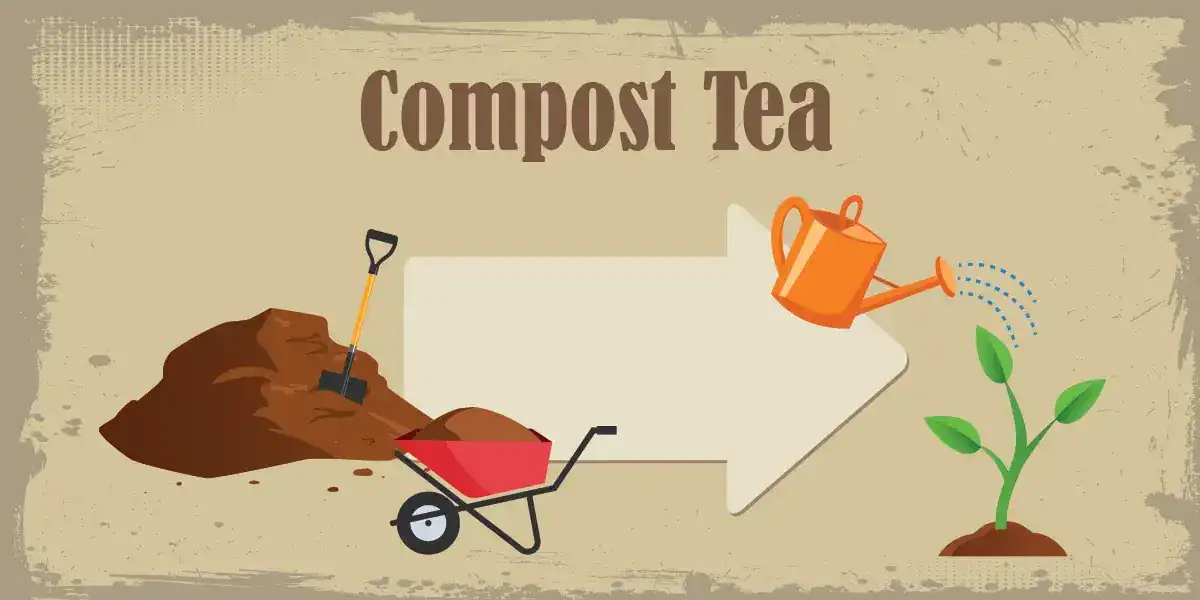Imagine a tea party where only plants are invited.
No pinky-pointing socialites. No crumpets and biscuits.
The tea is a home-brewed concoction of rotted vegetable matter and water.
Sounds delish, right? Only your plants will love it and beg for more.
What Is Compost Tea?
Compost comes from nutrient-rich decomposing organic matter like food scraps, leaves, and grass clippings. Microorganisms drive the composting process, breaking down material and turning it into a dark, crumbly substance with an earthy aroma.
Compost tea is a liquid extract derived from this decomposing matter. It contains microorganisms, nutrients, and organic matter that promote healthy plant growth. Think of it as a health tonic for your garden.
Steeping compost in water creates a “tea” packed with natural goodness and teeming with beneficial bacteria, fungi, and other microorganisms that release nutrients in forms that plants can readily absorb.
Compost tea is a safe, non-toxic, gentle, and eco-friendly alternative to synthetic fertilizers.
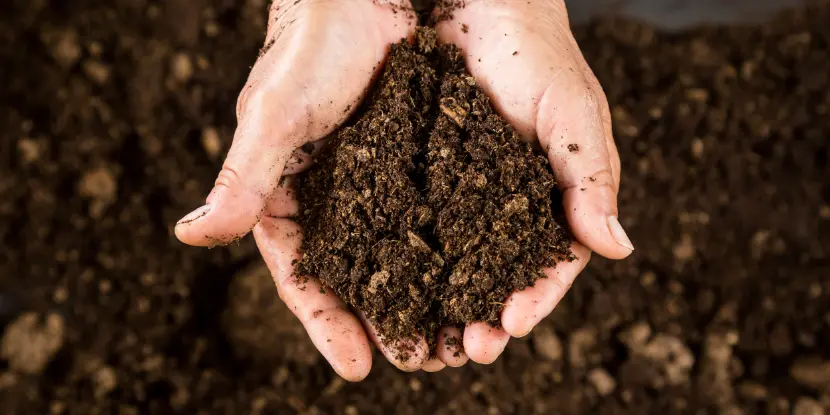
This compost is ready for a tea brew. Santé!
Uses for Compost Tea
- As a Foliar Spray: You can spritz compost tea onto plant leaves to boost their nutrients and beneficial microorganisms. This method works well for struggling plants that show signs of nutrient deficiencies.
- As a Soil Drench: Watering your plants with compost tea enriches the soil’s nutrient and microorganism profile.
- As a Seed Starter: Add compost tea to the potting mix, or use it as a seed-soaking solution to kick-start seedling growth.
- To Prevent Diseases: The beneficial microorganisms in compost tea suppress harmful pathogens.
- For Composting: Compost tea can activate new compost, accelerate the breakdown of organic matter, and speed up the composting process.
Making the Compost
- Pick a well-drained area for your compost pile or bin. It should be easily accessible and receive some sunlight.
- Collect organic materials such as fruit and vegetable scraps, eggshells, coffee grounds, grass clippings, leaves, and small branches. Avoid adding meat, dairy products, or oils, which can attract pests.
- Start by laying down a layer of coarse materials like small branches or straw to ensure airflow at the base. Then, alternate between green materials (rich in nitrogen) like vegetable scraps and brown materials (rich in carbon) like dried leaves.
- Keep the compost damp, similar to a wrung-out sponge. Water the pile occasionally if it dries, but avoid overwatering, which can lead to anaerobic conditions.
- Aerate the compost by turning it with a pitchfork or shovel every few weeks to introduce oxygen, which speeds up the decomposition process and prevents odor.
- If possible, measure the internal temperature of the compost pile. It should reach between 130-150°F (54-66°C), indicating active decomposition.
- Wait for the compost to break down into dark, crumbly, soil-like material, which usually takes several months. Turn the pile regularly to ensure even decomposition.
- Once the compost is ready, sift through a screen to remove large, uncomposted materials. Use the finished compost to make your compost tea or enrich your garden soil.
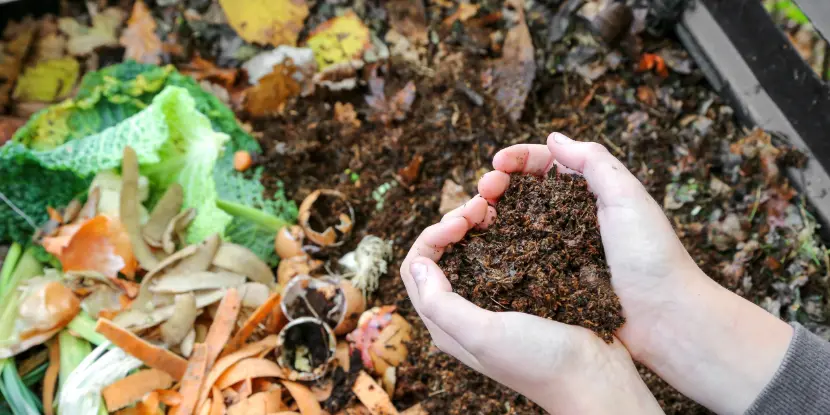
A gardener checks the health of her compost pile.
Brewing Compost Tea at Home
You’ll need:
- A container for brewing (a 5-gallon bucket works well)
- Compost
- Dechlorinated water
- An air pump and air stones (optional but recommended)
Steps for Brewing Compost Tea
- Use high-quality compost, either homemade or purchased from a garden center. Ensure it’s rich in organic matter and free from contaminants.
- Fill a 5-gallon bucket or similar container with dechlorinated water. Let tap water sit for 24 hours, or use rainwater to maintain the health of beneficial microorganisms.
- Place compost in a mesh bag or cheesecloth and submerge it in the water.
- Allow the compost to steep for 24 to 48 hours, stirring occasionally to facilitate nutrient extraction.
- Optionally, add molasses or fish emulsion to the brew as additional food sources for microorganisms.
- After the steeping period, remove the compost bag from the container.
- Use the compost tea promptly for maximum effectiveness. The beneficial microorganisms are most active when fresh.
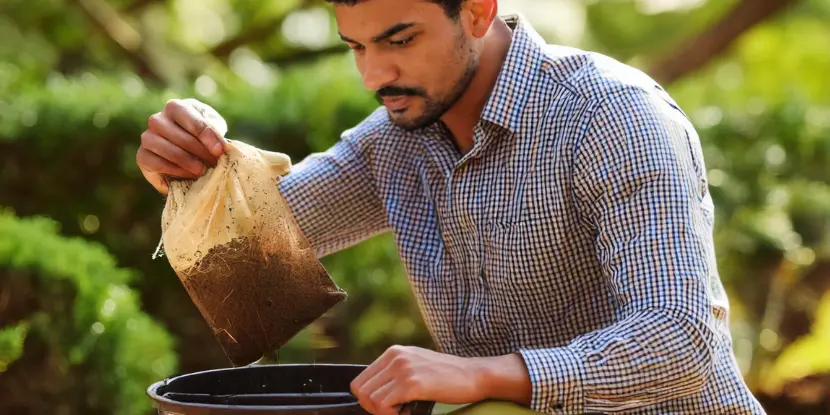
A gardener prepares a batch of compost tea.
What About the Air Pump or Air Stones?
Including an air pump or air stones in the brewing process ensures a continuous supply of oxygen in the water, creating an aerobic environment for microorganism growth.
Aerobic conditions also inhibit the growth of anaerobic bacteria, which can harm plants. An air pump or stones will create bubbles in the tea, increasing oxygen circulation and preventing stagnation.
This results in a richer, more effective compost tea. While not strictly necessary, using an air pump or air stones will significantly improve the microbial diversity in your brew.
Applying the Compost Tea
- Use a watering can or sprayer to apply the compost tea directly onto plant foliage and soil.
- Apply in the early morning or evening to avoid burning plant leaves.
- Dilute the compost tea with water at 1 part tea to 4 parts water for foliar application and 1 part tea to 10 parts water for soil drenching.
- For optimal results, apply compost tea every two weeks during the growing season.
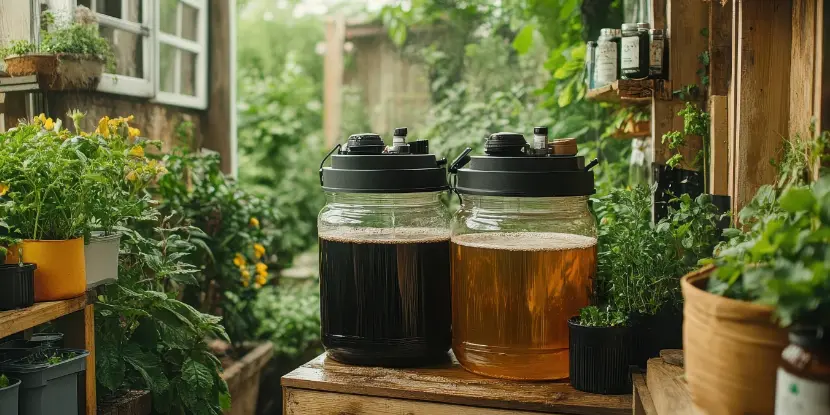
Compost tea is most potent when fresh. Never let it sit for more than a couple of days.
FAQs: More About Compost Tea
Q: How often should I apply compost tea?
The frequency of compost tea application depends on your garden’s needs. A good rule of thumb is to apply compost tea every two to four weeks during the growing season. However, if your plants show signs of nutrient deficiency or stress, you can use it more often.
Q: Can I store compost tea for later use?
Compost tea is most effective when used fresh, as the beneficial microorganisms decline over time. If you must store it, keep it in a cool, dark place and use it within a day or two. The fresher the tea, the more potent it will be.
Q: Is it possible to overuse compost tea?
Compost tea is a natural product, but it’s still possible to overdo it. Excessive application can lead to nutrient imbalances, so following the recommended application frequency is best. Monitor your plants and adjust your compost tea applications as needed.
Q: What type of water should I use for brewing compost tea?
Chlorine in tap water can kill microorganisms, so let it sit for 24 hours to dechlorinate, or opt for rainwater or distilled water as an alternative.
Q: Can I add other ingredients to enhance my compost tea?
Ingredients like molasses, fish emulsion, or seaweed extract can provide additional nutrients and serve as a food source for microorganisms, boosting their activity and effectiveness.
Q: How do I know if my compost tea is working effectively?
You should see noticeable improvements in plant health, vigor, and resistance to pests and diseases. Plants may exhibit brighter foliage, increased growth, and more blooms.
Q: Can I use compost tea on all types of plants?
While compost tea is generally safe for most plants, some delicate plants may react adversely. Test compost tea on a small section of your garden first and observe any negative reactions before spreading it widely.
Q: Is using an air pump and air stones necessary when brewing compost tea?
While not strictly necessary, using an air pump and air stones can enhance the brewing process by increasing oxygenation, promoting beneficial aerobic microorganisms’ growth.

